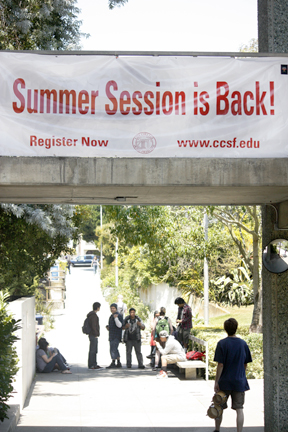Classes return this summer

By Elliot Owen
Despite $25 million in additional cuts to City College for the 2010-11 fiscal year, summer session is back after its elimination in 2010, and will be operating at its largest capacity since 2008 due to extensive budget restructuring efforts made by City College’s administration.
Cuts in 2009-10 caused an $18 million budget shortfall that resulted in the elimination of summer session 2010 with the exception of a few state-mandated vocational programs.
“We tried shutting the summer program down because there were bigger savings there than cutting during the year,” Board of Trustees President John Rizzo said.
As a result, City College experienced a severe backlash from students thrown off their educational paths.
“Those student don’t come back,” said Chris Jackson, vice president of the board.
“Summer 2010 being cancelled was an unacceptable sacrifice. Universally, we were told it was unacceptable. This board was very receptive of it, and we decided not to do that again.”
Class cancellations last year, in addition to budget cuts, caused City College to fall short of its base enrollment number. The state allocates a dollar amount to each community college based on their average enrollment. If the college fails to meet that number, they are held harmless for one year but must meet enrollment numbers the following year or face less resources provided by the state.
“The fewer students you have, the less funding you get,” Rizzo said.
If City College surpasses the base enrollment number for this year and actually grows between three and five percent as a result of summer session 2011, the state could award the campus $1-2 million in additional “growth dollars” for the next fiscal year.
“If we can have a really healthy strong summer session by meeting our enrollment, plus additional growth, we can draw down more dollars,” Jackson said. “This is one of the times where students can directly impact how many resources come to the college just by attending summer school.”
Summer session 2011 will include approximately 200 classes, each projected to register around 30 students. While the exact number of students that City College needs to meet both base enrollment and additional “growth” is not known, Jackson estimates it to be between two and five thousand. If enrollment growth is not achieved, “growth dollars” will not be awarded, and City College could face more class cuts next year.
The 2011 summer session was approved by the board during spring 2010 along with other strategies to help maintain the solvency of the college. Short-term classes have been added to increase enrollment, 57 administrators have retired and remain unreplaced, and a careful examination of donor funds took place. Many donations that have historically funded individual scholarships have been redirected towards actual classes where they will impact more students at a time.
In the face of $800 million in cuts to California Community Colleges, and an increase in the cost of classes from $26 to $36 per unit, Jackson remains optimistic.
“There’s a prediction that the 2012-2013 budget is going to be a good budget, one that we can actually start growing from,” Jackson said. “So we just need to maintain what we have and try to provide as much access as we can.”
Credit and non-credit summer classes will be held at Ocean, Mission, Evans, Downtown, Airport and John Adams campuses.
